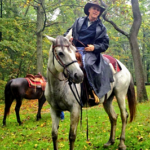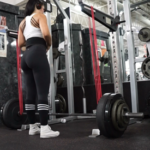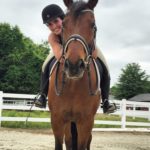I recently received a call from a friend with whom I’d not spoken in over a decade. He was doing well, but admitted to being generally bored with his life. He spoke about being tired of his 30-something bachelorhood, and of overanalyzing the dates he goes on. He wasn’t sure if he could even think about his life objectively enough to recognize the right person if they met. I wondered if our horses couldn’t offer some insight into his situation.

Horses are often good at helping us explore philosophical issues to discover things about our own behavior–either by their demonstrating an ineffective base instinct, or by revealing the simple truths buried beneath our all-too-human over-analysis.
Kimberly was gone for the week on business, so it was just me and the zoo–minus Vander. To keep him fit and his skills fresh, he was staying at our friend’s barn where Kimberly’s trainer worked and could ride him regularly. Removing the gelding from our equine mix made the three mares much calmer and more manageable.
I figured they could then focus more closely on our philosophical question: Is the grass always greener on the other side? (Horses seem like a shoo-in for evaluating this question.)
I love Madison. She is one of the sweetest horses I’ve met, which is good because her stall is always among the worst I’ve met. Just like Skip–a Quarter Horse we once owned–Madison has an ability to grind every poop into dust and mix in every pee spot so that there is no separating the salvageable shavings from the dirty ones. Unless you muck every three hours, her stall needs to be stripped after each time she’s inside. And every morning as I enter her stall and shake my head, I think about how much I love her and just start raking it all into the wheelbarrow.
“Madison,” I asked, “is the grass always greener on the other side?”
Her response was a resounding “yes.” When she’s inside she wants to be out. When the bucket’s empty and the hay flakes are gone, Madison wants another meal. When she’s in the back pasture, she stares over the fence at the pastures in the front.
The only thing that can distract Madison from her perpetual pursuit of “the other side” is if you scratch her neck. Accommodatingly, she rests her head on your shoulder so you can more easily reach both sides of her neck simultaneously. One time, I was scratching her when Kimberly dropped her dinner bucket and some hay. Madison’s head didn’t move from my shoulder for several more minutes.
Ellie agreed with Madison, which didn’t surprise me. Ellie’s approach is even more rigidly dogmatic than Madison’s. No amount of scratching could keep Ellie from the feed bucket and flakes. She is not swayed by the clever use of treats and if a windblown, unlatched pasture gate leaves you trying to block her in she will get past you.
Our pregnant mare, Mandy, was the only one for whom life’s dichotomy wasn’t so conventionally broken down. “For me,” Mandy offered, “it’s either out or in, and ‘in’ always wins.”
Mandy wasn’t kidding. One morning as I sat in the office, I heard whinnying and Hazel barking. I couldn’t see anything suspicious by looking out the window, so I grabbed my jacket and headed outside. When I got to the pastures, I saw Mandy’s gate open, swinging in the wind, and Mandy was nowhere to be seen. I know we should have replaced the lead line we used to tie the gate closed–and yes, I know we should have replaced it with a chain. The gate was bowed slightly and I assumed she had just leaned her 1,200 pounds against the gate until the cotton lead rope tore loose from its metal snap.
Fortunately, because Mandy is such a slow eater and Madison and Ellie get each other extremely riled up, each mare was turned out in her own pasture. Mandy was the only escapee. Ellie and Madison paced their fence lines while tossing their heads around and whinnying. They weren’t worried about Mandy like I was; they just wanted out, too.
I couldn’t see any clear hoof prints leading anywhere in particular. I ran to the front yard in the event she had headed towards the road. It’s not a busy road, but it would only take one vehicle to ruin Mandy’s–and everyone else’s–day. She was nowhere to be seen in the front yard or along the road. I ran to the smaller pastures on the east side of the house. No Mandy there. I ran back to the pastures on the west side, thinking perhaps she’d stuck around to be near Ellie and Madison. No such luck. Maybe they weren’t as good friends as I thought.
I was in a full-blown panic at this point. Calling Kimberly was not an option; she’d only get as worked up as I was and might even get mad at me for letting Mandy escape. As a guy in an agitated state of mind, I’d likely blurt out something unproductive like, “Wasn’t the lead line your idea anyway?” But if I did that, I’d probably have to pack my things and move into the Home for Stupid Men, and I really didn’t want to move.
I could call a neighbor to come help me look for Mandy. That was probably the best idea. I ran to the house to make that call when I heard a bucket being knocked around in the barn. I turned around and ran towards the sound.
Sure enough, Mandy was standing in her stall with the door wide open. What I heard must have been Mandy examining her empty bucket for any remaining bits of breakfast. Even without feed or hay, she just stood in her stall, resting her butt on the back wall and staring lazily at me as if she were about to go to sleep. I closed–and latched–her stall door and drove straight to the hardware store for some chain, staples and a sturdy snap.
Within 30 minutes Mandy was back out in her now securely gated pasture. She pushed on the gate a few times before resigning herself to being turned out on what was a beautiful, sunny day.
I thought Mandy’s contribution to the discussion was more a reaction to the fact that she had spent the previous years outside 24-7 no matter the weather, probably losing her feed and hay to the other animals who ate faster that she did.
When rain storms poured down on our farm and the horses came in, Vander, Ellie and Madison all stared outside. If they weren’t thinking they wanted to go out in the rain, they at least wanted the rain to let up so they could get out of the barn. Mandy, however, just leaned her big butt on her stall door and took a nap.
So what was our conclusion? Is the grass really greener on the other side? Some horses sure think it is. But horses are usually about what they want, not what they need, and they never care about “why” they do what they do. When they finally get over to the other, greener pasture, they look back over the fence at where they were before and it starts all over again. People do that, too, sometimes.
Perhaps we order the chicken and the steak plate looks better, or we’re working our job and our friend’s job looks better, or whatever our marital status is the other side might appear better.
Now we’ll never convince a horse to enjoy what he or she has. Our horses may enjoy something, but not because we suggested that they should. Fortunately people are different.
We may be moody at times and nothing we do feels satisfying, but we will eventually see past the appearance of things. We will eventually recognize all the good things that we have.
I sometimes wish I were closer to a city where I could find a wider assortment of interesting and affordable food ingredients. Sometimes I don’t feel like mucking stalls. Sometimes Kimberly and I argue about something stupid.
But, I know that there’s nowhere else like our out-in-the-middle-of-nowhere horse farm with our custom assortment of animals. I can easily lose count of all the stars in the nighttime sky and I still remember living in the city and thinking of how nice it would be to have some rural peace and quiet. I also know that mucking the stalls for the horses keeps them healthy and happy (especially Mandy) so they can keep teaching us things.
And I am acutely aware that despite any intermittent rough patches and despite all the horse, cat and dog hair on all my clothing, Kimberly’s horsey life saved mine and I love her for that. With her help, I may even grow up some day.
So I told my bachelor friend he needed to get a horse, or at least date someone who has a horse. After a brief silence, he said he had to go and asked that I call him back when I was sober. He’ll come around, but I think he’s still “looking over his fence.”
Later, I dropped the horses’ dinner buckets, feeling giddy and excited about Kimberly coming home the next day. “Hey,” I said to Madison as I stood beside her in the pasture scratching her neck, “remind me to get mom some flowers before I head to the airport.”
Her bucket and hay remained untouched on the ground as she sighed and leaned her head firmly on my shoulder.
Jeremy Law and his wife, Kimberly, live on a small farm in North Carolina.
Read Jeremy’s other columns in EquiSearch.com’s Humor section, and share your comments in the forum.







